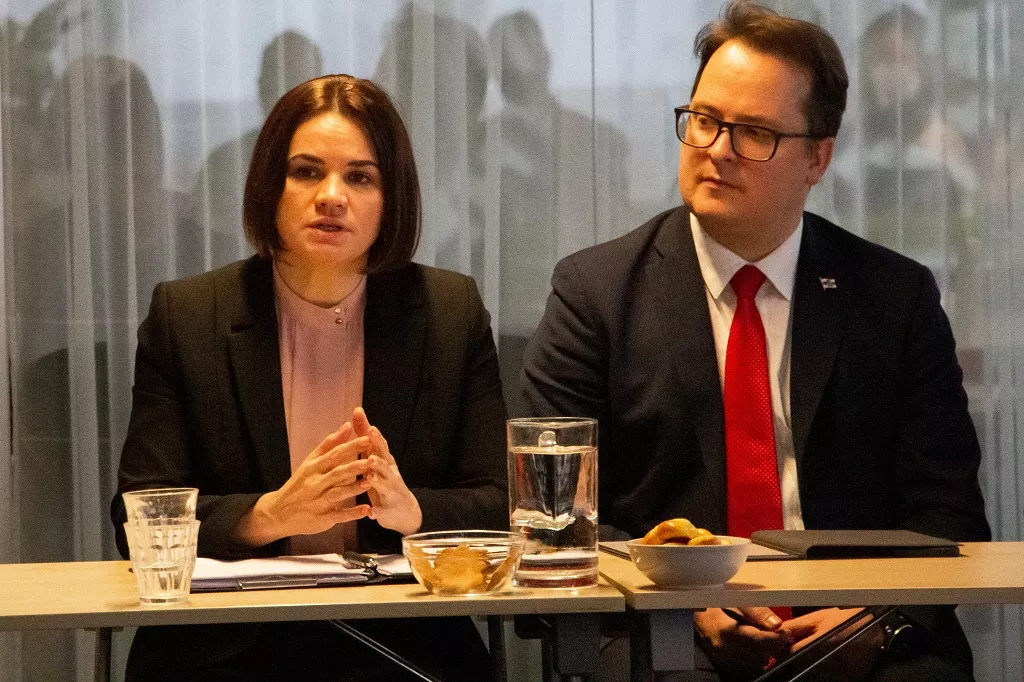Grassroots are the strength of the revolution

While in Sweden to meet with politicians such as Sweden’s newly appointed minister for development cooperation and speaker of parliament, she made sure to make time for civil society. The EaP network, which consists of Swedish civil society organisations with both interest and partnerships in Belarus, were there to listen but also to share their insights and efforts to assist the people of Belarus.
Topics concerned sanctions and their effectiveness, organizing within the Belarusian diaspora, the situation for vulnerable groups such as women and the LGBTI community, political prisoners and the many minors arrested, and not least, the way forward to achieve a democratic Belarus where the will of the people is listened to.
Her proximity to civil society and social movements is close and on the question of guiding and gather forces she was clear that was not her mandate.
The strength of the revolution is the diversity among grassroots. We created a platform to have a forum for civil society to engage in, but we should not make the terms.
It is perhaps tempting to look for unifying answers in a leader, when fighting a brutally violent regime. But Sviatlana Tsikhanouskaya emphasised that the strength of the resistance is the many different groups fighting from different positions and mobilizing their relevant constituencies. She has a role to play, but that is not one that should speak on behalf of others. Organized civil society already have a strong voice that should not be highjacked by a politician. In that sense, she represents the antithesis to current ruler Lukashenko.
On the topic of what Swedish civil society can do from our end she highlighted continuous pressure on the Swedish government. She explained her expectations on Sweden entering chairmanship of the OSSE during 2021 was high. But as it turned out:
The biggest disappointment of this year was the chairmanship of Sweden in the OSSE.
Expectations turned into frustration when the lack of focus on Belarus became evident. The Swedish government could simply have put more political pressure on Lukashenko during the opportunity in OSSE. Her request to the civil society representatives in the room was therefore to keep up the good relations, now counting 25 years of solidarity bonds, with civil society in Belarus and to pressure Swedish politicians for further political engagements.
Sviatlana Tsikhanouskaya made it clear that change does not lay with politicians. Like many freedom fighting leaders before her, she is closer to the pain but also the hopes of a people who have had enough of the status quo. People and collectives are more important and powerful than politicians and individuals.
Our main strength is the support from the ground.
She underlined that although people are still detained every day, the regime is afraid of its people. The situation is worsening for the regime with continued resistance and international pressure and Lukashenko is afraid of betrayal in his own ranks. With consistent and continued resistance, she seems certain that the regime will fall.
To international development aid funders and European governments, she urged not only to direct support to civil society but also to:
view civil society as the legitimate state representatives.
Andra nyheter

The power of people powered Public-Private Partnerships
Public–Private Partnerships (PPPs) are often discussed in terms of roads, power plants, housing, and other large infrastructure projects. But as discussed on the People’s Partnership Podcast, PPPs are...

ForumCiv’s social media accounts labelled as “extremist materials” in Belarus
Important message to our Belarusian followers. Any interaction with our content can now lead to legal consequences in Belarus. Please read the information below and take the necessary precautions for...

ForumCiv enters new strategic partnership
ForumCiv is proud to announce a new three-year strategic partnership with Sida, totalling SEK 137 million.